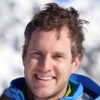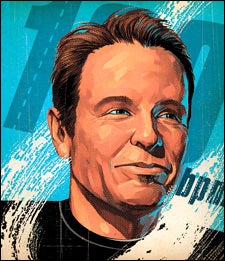I’d been a lawyer for eight years and was tired of keeping track of time in six-minute increments. So in late 2001, I did that stereotypical thing where you sit at the keyboard and think, What’s next? I started Evolve a month later. The idea was to be the IMG of action sports. I built my Web site and a stable of athletes that I would represent. It was a roller coaster early on. Then, in 2003, we bought the Silicon Valley Marathon and, after raising money from an angel investor, launched Mavericks Surf Ventures, which owns the Mavericks brand and produces the surf contest. We have grand aspirations for Mavericks: We launched an apparel line in February, we’re rolling out a live concert tour this summer, and we have plans for a film tour. I raised $1.4 million of private equity selling into the teeth of the recession. If you can distinguish your business, there are opportunities.
Keir Beadling
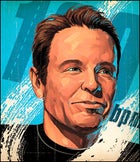
Claudia Becker
Owner, Big Picture Theater, Waitsfield, VT
Claudia Becker

I came to the Mad River Valley in 1996 to train Icelandic horses and moved up here with my family from New York after 9/11. I started the Mountain Top Film Festival in 2004 at the local theater as a form of social and political outreach. My husband, Eugene Jarecki, is a filmmaker, but I was a teacher in Germany and had never done anything like it. I went to the local businesses and asked for $50, $100, and got great support. Then the theater closed down and everyone was looking at me to buy it. I’d never spent more than $1,000. I literally got that book How to Write a Business Plan. I started out doing it almost all by myself: making popcorn, showing movies, sweeping floors. Now I have 15 staff members, we’ve added a café, and we’re the focal point of community activity. It’s so much more than I ever imagined.
David D’Angelo
Filmmaker, Serac ���ϳԹ��� Films, Boulder, CO
David D'Angelo
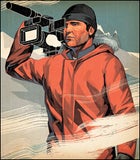
I met Serac founder Michael Brown in 1999, on Aconcagua. I was 20 years old, on winter break from the University of Colorado, and in awe of what he didgetting paid to film adventures. I interned for him after that. It helps when you’re willing to do the less-than-fun stuff for free: packing, shipping, invoicing. When I graduated, I was an editor for ExplorersWeb; a couple years later Michael hired me at Serac. In 2004, I took $15,000 cash out on a zero-percent-interest credit card and summitted Everest with a Russian expedition. That made getting another foot in a door a lot easier. I was also always learning about new equipment and techniques. So when someone needed a fill-in shooter on set, I went from coffee getter to cameraman. I’ve since worked on seven films and shot for the Discovery Channel and National Geographic. You never know when you’ll have your chance; be ready for it.
Corey Senese
Surf Guide, Coreyswave, Montauk, NY
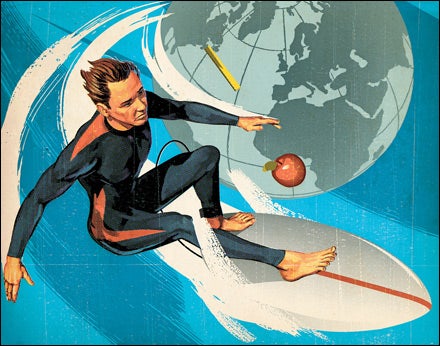
My father taught me to surf in San Diego, and I spent summers in Montauk. By 2003, surf lessons were taking off on Long Island. The thing that really triggered my interest was seeing instructors profit while not teaching safety and respect for the ocean. I started by re-teaching some of those students for free. The first serious lessons I gave were in 2004, for three boys from Spain. I taught them every day for a month and got hooked. So I signed up with a local surf shop to get more students. The next summer I began teaching full-time. I ended up with so many lessons I couldn’t do them all. Launching my Web site [] and taking clients on trips was a natural next step. I’ve taken them to Costa Rica, Mexico, Puerto Rico, Florida, California, and Hawaii. I get people connected to the ocean and help them forget about their problems. I’ve found a way to make my passion support me.
Dan Abrams
Founder, FlyLow Gear, Denver, CO
Dan Abrams
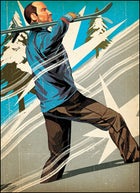
During college, at the University of Puget Sound, I was going through a pair of ski pants a season. That was the original impetus: to make a tougher ski pant. In 2001, I was supposed to get trained as a ski guide in Alaska, but I blew out my knee. Instead I got a master’s in international development at Denver University. One of my professors convinced me business is all about perception, so FlyLow started by making T-shirts. I financed the launch mostly with credit cards. And I bartended. It’s amazing how much networking you can do at a bar. I’d say 80 percent of the people I talked to said I was crazy. But you know what? They were wrong. Now we’ve got a line of jackets and pants, midlayers, gloves, women’s outerwear. We’ve got reps in almost every region of the U.S., and despite the recession, we almost doubled sales last year. I still ski four or five days a week, though.
Business Sense
Career advice from the pros
Dan Abrams

1. LOG OFF MONSTER.COM
Same goes for CareerBuilder, Craigslist, and whatever other sites you might be obsessively trolling when you’re not updating your résumé for the fourth time this week. For a smarter allocation of job hunting time, we consulted Nancy Franz, a Denver-based career and life coach with clients at Fortune 500 companies.
Case Your Field: 25%
Get informed on the status and trajectory of your chosen profession through news and magazine stories, books, and blogs.
Talk to People: 20%
Meaning people doing what you want to do. Use connections (family, friends, alumni networks), and be professional: Request 15 minutes, ask pointed questions, and offer to send them in advance. Take notes.
Act the Part: 20%
Join the trade associations in your target= field (frequently just a fee will get you in) and hit up meetings, trade shows, and conferences. Network. Buy people drinks. Schmooze.
Search Job Listings: 10%
But don’t become an addict. Print out favorites and keep a running file so you can look for patterns and trends in required qualifications, duties, and compensation.
Blow Off Steam: 10%
Bike, run, surf, ski, etc. This is when you’ll really figure out what to do with your life.
Research Qualifications: 15%
Do you really need a degree? Or can volunteering or an internship suffice? If school is a must, find the best programs—and maybe ones that allow for part-time work—and see where their grads are ending up.
2. TAKE ELECTIVES
Using the downturn to get a high-value graduate degree: good choice. Picking a top school that caters to your extracurricular habits: better choice.
Surfing
Law Degree:USC
M.B.A.:UCLA
Environmental Engineering: Cal Tech
Cycling
Law Degree: UVA
M.B.A.: Stanford
Environmental Engineering: UT Austin
Skiing
Law Degree: UC Boulder
M.B.A.: Dartmouth
Environmental Engineering: CSU Fort Collins
Paddling
Law Degree: UW Seattle
M.B.A.: Georgetown
Environmental Engineering: UNC Chapel Hill
3. LICENSE TO CHILL
Given the state of the job market, it’s entirely reasonable to think that getting laid off is a great excuse to take off. In fact, done right, your unexpected sabbatical might be as good for your résumé as your mental health. Just be able to check these boxes.
Concept
Think, How could I position this experience to an employer in the future? “Sabbaticals are a way to brand yourself,” says Elizabeth Pagano, founder and editor of . “They help distinguish you in a competitive job market.” You didn’t climb Aconcagua for kicks—you were developing leadership and communication skills.
Commitment
A true sabbatical is measured in months, not weeks. A quick surf trip to Costa Rica isn’t you rethinking your career; it’s you vacationing.
Cash
You want enough money to cover the time away and the time to job-hunt when you get back. Two strategies for fattening the travel wallet: Sublet or swap your home or spend at least part of your sojourn volunteering for a program that can subsidize living expenses.
–Kate Siber and Ryan Krogh



